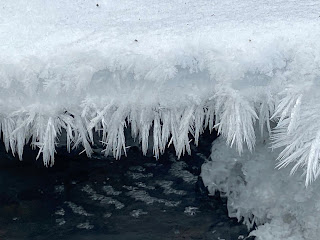We had a wonderful week back from February Vacation! It was wonderful to see everyone and dive back into learning.
With the completion of our last science unit, this week we have been working on creating informational writing pieces based on the knowledge we have learned about how things change over time. Students are using artifacts found within a watery cave as evidence to support their claim. We hope to have these writing pieces completed within another week or so. In years past, I have hosted Writer's Celebrations. These celebrations were a time for families to come in and listen to their children share their writing pieces with an audience. I'm thinking we can host something similar to this, virtually. Be on the lookout for more information regarding this event in the upcoming week.
We returned to our reading and math groups throughout the week. In our reading groups, we continue to focus on character motivation (why is the character acting the way they do?), dialogue (making sure our reading voice matches the feeling of the text), and the author's craft (reading the text the way the author intended us to read it and determining what the message of the book might be). In math, we continue to strengthen our multi-digit addition and subtraction skills. Soon, we will be moving onto our next unit, Introduction to Fractions. Anytime you have a moment in the kitchen, encourage your kiddo to take note of the various measuring cups you have in your drawers. Discuss observations they have about the different sizes and shapes of the measuring tools. Anything hands-on will only deeper their understanding of fractions when we begin our next unit.
This week the weather was certainly on our side. We had temperatures reaching 40 degrees on Wednesday. Besides Class Council. students were able to spend the entire day learning outside. It was wonderful to reduce the number of transitions to and from the building and spend more time in the sunshine. On Friday, we had the opportunity to tap our beloved maple trees again and began the sugaring process! It was around this time last year that we shut down, and couldn't see the whole tap-to-table process, but I am keeping my fingers this year we will all be able to see our hard work pay off.
Here are some questions to spark conversation:
-What happened with the mice on Wednesday?
-What artifacts are you writing about in your information piece?
-What time of year can we tap maple trees?
-What did you think was impossible before the school year began? How has that changed over time?
Here are some pictures from the week:
 |
| Building an ice ship |
 |
| Beautiful temperatures midweek! |
 |
| Finding bucket ice first thing each morning |
 |
| Perfect way to start our day together |
 |
| Mi Maestra (our Spanish teacher) joined us in the woods this week as well |
 |
| In celebration of the 100th day, every student built a snowman! |
 |
| Adding lids to our maple buckets! Best way to end the week! |





















